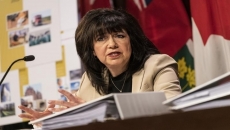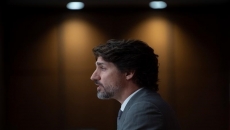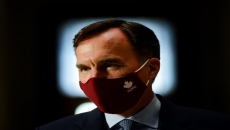An Indigenous-run lobster fishery off the coast of southwestern Nova Scotia isn't the big environmental threat that it's being made out to be, according to a fisheries expert.
The contentious fishery started by the Sipekne'katik First Nation in St. Marys Bay isn't likely to make a dent in the stocks of the crustacean in the area, Megan Bailey, professor at Dalhousie University's Marine Affairs program, said in a recent interview.
"The scale of the livelihood fishery as it exists right now with 350 traps is not a conservation concern," Bailey said. "With 350 traps, if you multiply that by ten I still don't think it would be a problem."
Mi'kmaq fisherman say non-Indigenous fishers have threatened and intimidated them for their off-season fishery. The Sipekne'katik First Nation says non-Indigenous fishermen removed 350 Mi'kmaq lobster traps from the water last weekend and vandalized equipment and vessels.
Colin Sproul, president of the Bay of Fundy Inshore Fishermen's Association, helped remove the traps. He has said lobster-fishing season in St. Marys Bay doesn't start until the last Monday of November in order to let the animals reproduce and to make sure their stocks aren't depleted.
Mi'kmaq fishermen, however, point to a 1999 Supreme Court decision that affirms their treaty right to fish for a "moderate livelihood." They say that treaty recognizes their right to fish where they want and when they want, regardless of the off-season rules established by the federal government.
As of December 2018, there were 979 lobster licenses issued in the fishing area around St. Marys Bay, according to the Department of Fisheries and Oceans, Bailey said. Those numbers show that sustainability of the lobster stocks are not threatened, she added.
"There are a thousand commercial fishing boats fishing 350 traps everyday, more or less, between November and May," she said. The lobster fishery of the Sipekne'katik First Nation, with seven licenses to fish from 350 traps, "is about the equivalent then, of one of those commercial boats."
Bailey has worked with both Mi'kmaq and commercial fishermen for her classes at the university and said the larger concern from both sides comes from a lack of action from the federal government. "Neither side is demonizing the fishing sector, Indigenous or non-Indigenous. It's really about transparency and leadership from the government that's required."
On Friday, Sipekne'katik Chief Mike Sack said his community is working to establish regulations for its fishery. In a news release, Sack called for a meeting with Nova Scotia Premier Stephen McNeil to discuss how to better define what constitutes a "moderate livelihood fishery."
Sack said he recognizes it is currently illegal for people to purchase lobster caught outside the commercial fishing licence system, which is operated by the Fisheries and Oceans Canada Department.
Those regulations, however, run counter to the 1999 Supreme Court decision "that found the Mi'kmaq have a legal right to fish and trade outside the DFO licensing regime."
"Today's call is for an amendment to this flawed system that is a direct infringement of the Mi'kmaq right to trade and sell," Sack said.






